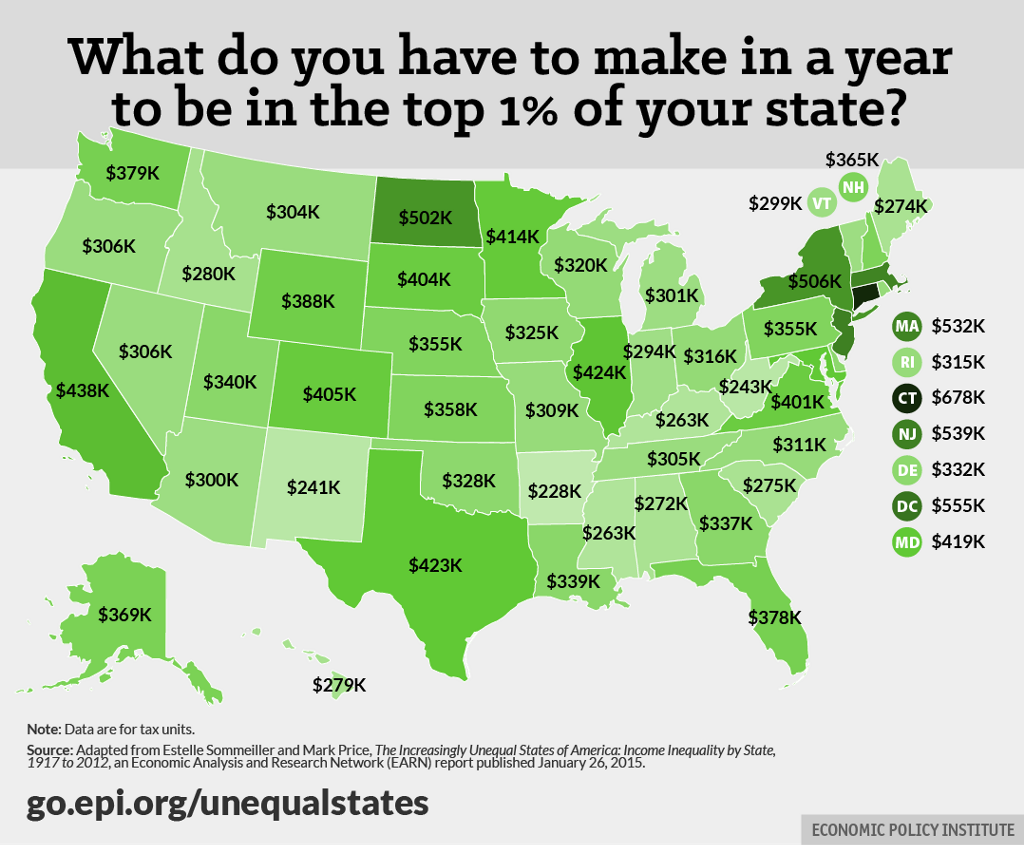How Underpaid Are You Relative To The Rest Of America?
Let’s see!

In 2013, Kevin Short put together an infographic and bullet list summing up America’s inequality crisis, based on 2012 info about net income from the Social Security Administration. For some reason it has resurfaced and is now all over my Facebook feed; and if you read the comments, they are 75% people suggesting that we fix the problem in one simple way: “Vote Bernie!”
Short writes that “more than half of U.S. wage earners made less than $30,000 last year.” My first thought was, Gee, that’s not a lot! My second was, Gee, that’s … me?
* If you make more than $10,000, you earn more than 24.2% of Americans, or 37 million people.
* If you make more than $15,000 (roughly the annual salary of a minimum-wage employee working 40 hours per week), you earn more than 32.2% of Americans.
* If you make more than $30,000, you earn more than 53.2% of Americans.
* If you make more than $50,000, you earn more than 73.4% of Americans.
* If you make more than $100,000, you earn more than 92.6% of Americans.
* You are officially in the top 1% of American wage earners if you earn more than $250,000.
The situation seems particularly stark when laid out this way, which is perhaps why this short-read gained so much traction. Bear in mind, these are all wage-earners; the numbers aren’t skewed by the inclusion of children, retirees, or the unemployed.
Some thoughts:
- Kind of ironic for a piece like this to run on HuffPo, at which, if you make over $10K — or, frankly, more than $1 — you earn more than the vast majority of the site’s 100,000+ unpaid contributors. Stephen Hull of HuffPo UK just got in trouble over the issue:
“If I was paying someone to write something because I want it to get advertising, that’s not a real authentic way of presenting copy,” Hull said. “When somebody writes something for us, we know it’s real, we know they want to write it. It’s not been forced or paid for. I think that’s something to be proud of.”
When asked about Hull’s remarks (which caused a stir among journalists over the next 24 hours), Huffington Post doubled down on the comment, saying in a statement to International Business Times that the site’s bloggers — apparently all 100,000 of them — are satisfied receiving no compensation.
“Our bloggers are happy with this arrangement, and happy to access the platform and the huge audience it brings, without having to build, pay for, edit, moderate or maintain that platform,” the statement read. “Indeed, we are inundated with requests from people who want to blog. The proof is in the pudding: People are looking to join the party, not go home early.”
Uh, well, after contributing for free a couple of times early in my career, and getting to go on Geraldo because of it, I went home early, and I’m sure I’m not the only one. But the larger point is indisputable: as long as people keep volunteering to be exploited, sites like HuffPo will continue to exploit them.
Here’s Writer Unboxed, throwing down the gauntlet:
if you write for The Huffington Post, you have willingly deprived not only yourself of the payment you should have, but you have also helped to deprive others. You have perpetuated this cult-of-free among writers and, worse, among the employers and consumers of writers’ labor. The Post is different from a blog site like Writer Unboxed or an author’s site or a non-profit organization’s site. It’s a commercial site. It has the money to pay you. And its policy of using unpaid writers helps to impoverish the art and business of writing.
Some writers I respect are calling for a boycott of HuffPo links, on the assumption that if we stop circulating them, we will be striking a blow for what is good and honorable in the world — you know, paying Internet writers pittances rather than nothing. I’m considering it.
Back to the original piece, though:
- The article is titled, “Everyone In America Is Even More Broke Than You Think,” although the numbers given are all related to net income. That seems like a leap to me. Yes, people may not be bringing home a lot, on average, but that doesn’t make them “broke.” In certain parts of the country especially, you can get by without a problem on $30K.
- Making more than $250,000 puts you in “the 1%,” nationwide, and that’s before we factor in how much your household makes or how much you make additionally from investments and interest. Over at my reaction to the San Francisco resident who wrote the open letter to the mayor about having to see poor people, a couple of us are having a sidebar conversation about the term “one-percenters,” whether it’s useful and under what conditions. Feel free to join in; I’m interested in hearing more opinions.
If it’s helpful, here’s a more specific breakdown of what income would put you in the 1% in 2015, state-by-state.

- Does looking at this data make you, like those HuffPo commenters, more inclined to #feeltheBern?
Support The Billfold
The Billfold continues to exist thanks to support from our readers. Help us continue to do our work by making a monthly pledge on Patreon or a one-time-only contribution through PayPal.
Comments